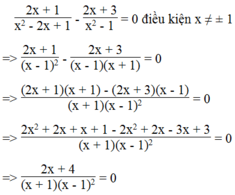Tìm x biết
3x2-2x+1 phần 3 =0
Hãy nhập câu hỏi của bạn vào đây, nếu là tài khoản VIP, bạn sẽ được ưu tiên trả lời.



Biểu thức bằng 0 khi tử bằng 0 và mẫu khác 0
Ta có: 2x + 4 = 0 => x = - 2 (thỏa mãn điều kiện)
Vậy với x = - 2 thì giá trị của biểu thức bằng 0.

\(a,\Leftrightarrow x^2+2x+1-x^2+3x-2x=3\\ \Leftrightarrow3x=2\Leftrightarrow x=\dfrac{3}{2}\\ b,\Leftrightarrow x^2-x-6-x^2+6x-9=15\\ \Leftrightarrow5x=30\Leftrightarrow x=6\\ c,\Leftrightarrow x^3+3x^2+3x+1-x^3-3x^2-2x+3=0\\ \Leftrightarrow x=-4\)
a) \(\left(x+1\right)^2-x\left(x-3\right)=2x+3\Rightarrow x^2+2x+1-x^2+3x=2x+3\)
\(\Rightarrow3x=2\Rightarrow x=\dfrac{2}{3}\)


Bài 1:
a: \(=6x^3-10x^2+6x\)
b: \(=-2x^3-10x^2-6x\)
Bài 4:
a: =>3x+10-2x=0
=>x=-10
c: =>3x2-3x2+6x=36
=>6x=36
hay x=6
Bài 1:
\(a,=6x^3-10x^2+6x\\ b,=-2x^3-10x^2-6x\)
Bài 4:
\(a,\Leftrightarrow3x+10-2x=0\Leftrightarrow x=-10\\ b,\Leftrightarrow x\left(2x^2+9x-5\right)-\left(2x^3+9x^2+x+4,5\right)=3,5\\ \Leftrightarrow2x^3+9x^2-5x-2x^3-9x^2-x-4,5=3,5\\ \Leftrightarrow-6x=8\Leftrightarrow x=-\dfrac{4}{3}\\ c,\Leftrightarrow3x^2-3x^2+6x=36\Leftrightarrow x=6\)
Bài 1:
\(a,=7xy\left(2x-3y+4xy\right)\\ b,=x\left(x+y\right)-5\left(x+y\right)=\left(x-5\right)\left(x+y\right)\\ c,=\left(x-y\right)\left(10x+8\right)=2\left(5x+4\right)\left(x-y\right)\\ d,=\left(3x+1-x-1\right)\left(3x+1+x+1\right)\\ =2x\left(4x+2\right)=4x\left(2x+1\right)\\ e,=5\left[\left(x-y\right)^2-4z^2\right]=5\left(x-y-2z\right)\left(x-y+2z\right)\\ f,=x^2+8x-x-8=\left(x+8\right)\left(x-1\right)\\ g,\left(x+y\right)^3-\left(x+y\right)=\left(x+y\right)\left[\left(x+y\right)^2-1\right]\\ =\left(x+y\right)\left(x+y-1\right)\left(x+y+1\right)\\ h,=x^2+3x+x+3=\left(x+3\right)\left(x+1\right)\)

Bài 1:
\(a,=6x^2+6x\\ b,=15x^3-10x^2+5x\\ c,=6x^3+12x^2\\ d,=15x^4+20x^3-5x^2\\ e,=2x^2+3x-2x-3=2x^2+x-3\\ f,=3x^2-5x+6x-10=3x^2+x-10\)
Bài 2:
\(a,\Leftrightarrow3x^2+3x-3x^2=6\\ \Leftrightarrow3x=6\Leftrightarrow x=2\\ b,\Leftrightarrow6x^2+3x-6x^2+9x-2x-3=10\\ \Leftrightarrow10x=13\Leftrightarrow x=\dfrac{13}{10}\)

a: Ta có: \(40x^4+5x=0\)
\(\Leftrightarrow5x\left(8x^3+1\right)=0\)
\(\Leftrightarrow x\left(2x+1\right)=0\)
\(\Leftrightarrow\left[{}\begin{matrix}x=0\\x=-\dfrac{1}{2}\end{matrix}\right.\)
b: Ta có: \(8x^2-2x-1=0\)
\(\Leftrightarrow8x^2-4x+2x-1=0\)
\(\Leftrightarrow\left(2x-1\right)\left(4x+1\right)=0\)
\(\Leftrightarrow\left[{}\begin{matrix}x=\dfrac{1}{2}\\x=-\dfrac{1}{4}\end{matrix}\right.\)

a:
Sửa đề: \(\dfrac{1}{x-1}-\dfrac{3x^2}{x^3-1}=\dfrac{2x}{x^2+x+1}\)
=>x^2+x+1-3x^2=2x(x-1)
=>-2x^2+x+1-2x^2+2x=0
=>-4x^2+3x+1=0
=>4x^2-3x-1=0
=>4x^2-4x+x-1=0
=>(x-1)(4x+1)=0
=>x=1(loại) hoặc x=-1/4(nhận)
b: =>2x+6x=x+3(2x+1)
=>x+6x+3=8x
=>7x+3=8x
=>-x=-3
=>x=3(nhận)
\(\frac{3x^2-2x+1}{3}=0\)
mà \(3\ne0\Rightarrow3x^2-2x+1=0\)
\(\Rightarrow\left(3x-2\right)x=-1\)
TH1:3x-2=1 và x=-1
thay vào ta có:-3-2=1(vô lý)
TH2:3x-2=-1 và x=1
thay vào ta có:3-2=-1(vô lý)
Vậy ko có x thỏa mãn